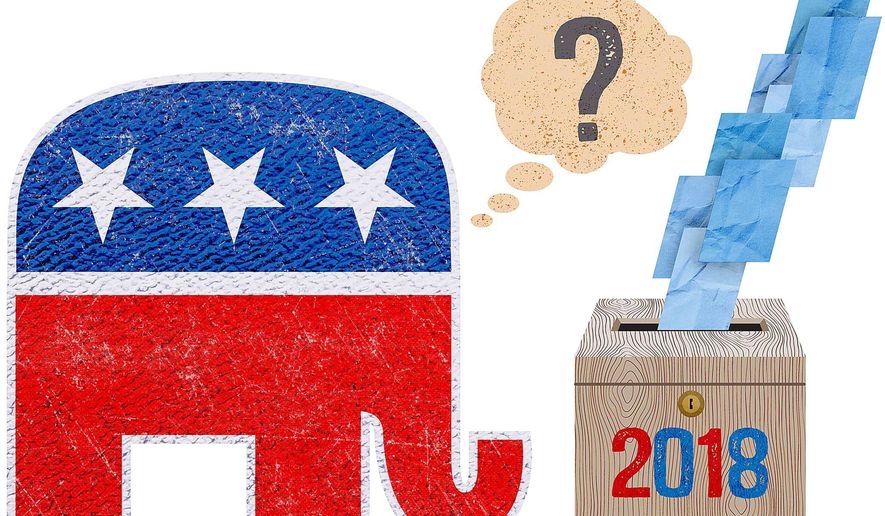OPINION:
Republicans could learn a lot from the midterms, but it’s going to be tough tethered to President Trump.
His 2016 victory was built on disaffected blue-collar males and older, overtaxed college graduates. That was enough for a rather odd electoral vote majority, because the Democratic coalition — younger college-educated voters, working women and minorities — was not energized by the abrasive Hillary Clinton.
Democrats pasted the GOP in 2018 because its base’s voting-age population is growing faster than Mr. Trump’s base. And they launched an effective disinformation campaign alleging Republicans want to deny health insurance to folks with pre-existing conditions, cut taxes for the rich at the expense of decent public services, and keep women and minorities in perpetual states of servitude.
It bears noting, similar factors cost Republicans seats in both the House and Senate in 2016.
If those trends continue and the Democrats don’t nominate another polarizing candidate, Mr. Trump will have a tough time winning in 2020. The Republicans stand a good chance of losing the Senate and to avoid being thrust into permanent minority status, they must find new and better ways to appeal to women and minorities.
Democratic success in House elections with moderate candidates in swing districts indicates those voters are not strongly ideological but rather want solutions — reasonably priced health care, better roads and mass transit, affordable higher education and progress on pay gaps between white men and women and minorities.
Hard-left Democrats want socialized medicine, a massive infrastructure program, free tuition at state universities and draconian regulations on private sector pay and hiring.
Centrist Democrats may be willing to deal with Republicans but the GOP will have to let go of notions that simply relying on free markets, tax cuts and deregulation provides enough solutions. If that were true, California and New York would have lower health care costs than smaller states, Democrats would not have flipped gubernatorial seats in states like Kansas and Wisconsin, private college tuition would not be rising even faster than health care, and radical women’s groups would not be able to paint the GOP as intent on banning birth control and requiring hats, veils and corsets.
The GOP should champion the break up of drug and hospital monopolies and benchmarking prices to those charged in European countries with similar private insurance systems, restricting federal grants and student loans at universities that won’t slash bureaucracies to lower tuition, requiring businesses to publish employee salaries to facilitate transparency, and raise $100 billion annually for infrastructure by imposing corporate taxes on imports and rebating those on exports.
The latter would meet fierce opposition from the Koch Brothers and Walmart but the GOP needs to understand it is no longer the party of big business. The Democrats have Facebook, Amazon, Alphabet, Netscape and Google and rely on those and big media to shape public opinion.
All those ideas would make markets work better — for example, foreign competitors already impose value added taxes on imports and rebate those on exports. However, it all requires letting go of old ideas — something Republicans are slower than a centipede to do.
If the centrist Democrats won’t bite or are too constrained by the Bernie Sanders — Alexandria Ocasio-Cortez wing of their party, then the GOP needs to take those ideas directly to the cities and suburbs.
It’s not enough to nominate women and people of color. The GOP needs to send its aspiring candidates to churches, community centers and coffee shops—in the long months between biennial campaigns to explain those solutions.
Many Republicans may blame their recent debacle on Donald Trump’s behavior, and John McCain and a few other Republican senators voting against their bill to repeal and replace the ACA.
There is some truth in all that but the Republican congressional candidates went into the midterms without a strong leader. Paul Ryan was quitting at age 48 because he did not want his teenage children seeing their father only on weekends.
It seems moving his family, as many other leaders have done, from bucolic Wisconsin to Washington D.C. — a.k.a. urban America — was more than his Middle American instincts could bear.
Well, Washington is not Sodom and Gomorrah, and urban America is where the votes are—and the battle is. If Republican don’t start showing up there, they will go the way of the Whigs.
• Peter Morici is an economist and business professor at the University of Maryland, and a national columnist.




Please read our comment policy before commenting.